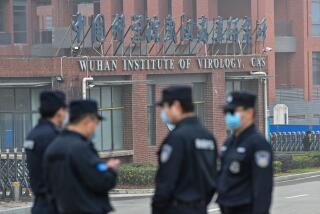‘Reports ... Were Seriously Flawed’
- Share via
Reports received from a liaison service [another government’s intelligence agency] on Iraqi production of biological agent were seriously flawed....
We do not believe that over-reliance on dissident and emigre sources was a major cause of subsequent weaknesses in the human intelligence relied on by the UK.
*
In general, we found that the original intelligence material was correctly reported in JIC [Joint Intelligence Committee] assessments. An exception was the 45-minute report. But this sort of example was rare.
We should record in particular that we have found no evidence of deliberate distortion or of culpable negligence.
We found no evidence of JIC assessments and the judgments inside them being pulled in any particular direction to meet the policy concerns of senior officials on the JIC.
*
Strenuous efforts were made to ensure that no individual statements were made in the dossier which went beyond the judgments of the JIC. But, in translating material from JIC assessments into the dossier, warnings were lost about the limited intelligence base on which some aspects of these assessments were being made....
*
Even now it would be premature to reach conclusions about Iraq’s prohibited weapons. Much potential evidence may have been destroyed in the looting and disorder that followed the cessation of hostilities. Other material may be hidden in the sand, including stocks of agent or weapons....
But as a result of our review ... we have reached the conclusion that prior to the war the Iraqi regime:
a. Had the strategic intention of resuming the pursuit of prohibited weapons programs, including if possible its nuclear weapons program, when United Nations inspection regimes were relaxed and sanctions were eroded or lifted.
b. In support of that goal, was carrying out illicit research and development and procurement activities to seek to sustain its indigenous capabilities.
c. Was developing ballistic missiles with a range longer than permitted under relevant United Nations Security Council resolutions, but did not have significant, if any, stocks of chemical or biological weapons in a state fit for deployment, or developed plans for using them.
*
The JIC made it clear that the Al Qaeda-linked facilities in the Kurdish Ansar al Islam area were involved in the production of chemical and biological agents, but that they were beyond the control of the Iraqi regime.
The JIC made clear that, although there were contacts between the Iraqi regime and Al Qaeda, there was no evidence of cooperation.
*
From our examination of the intelligence and other material on Iraqi attempts to buy uranium from Africa, we have concluded that:
a. It is accepted by all parties that Iraqi officials visited Niger in 1999.
b. The British ... had intelligence from several different sources indicating that this visit was for the purpose of acquiring uranium. Since uranium constitutes almost three-quarters of Niger’s exports, the intelligence was credible.
c. The evidence was not conclusive that Iraq actually purchased, as opposed to having sought, uranium and the British government did not claim this.
d. The forged documents were not available to the British government at the time its assessment was made ....
More to Read
Sign up for Essential California
The most important California stories and recommendations in your inbox every morning.
You may occasionally receive promotional content from the Los Angeles Times.













